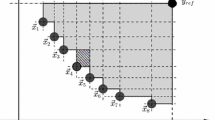Abstract
R2HCA-EMOA is a recently proposed hypervolume-based evolutionary multi-objective optimization (EMO) algorithm. It uses an R2 indicator variant to approximate the hypervolume contribution of each solution. Meanwhile, it uses a utility tensor structure to facilitate the calculation of the R2 indicator variant. This makes it very efficient for solving many-objective optimization problems. Compared with HypE, another hypervolume-based EMO algorithm designed for many-objective problems, R2HCA-EMOA runs faster and at the same time achieves better performance. Thus, R2HCA-EMOA is more attractive for practical use. In this paper, we further improve the efficiency of R2HCA-EMOA without sacrificing its performance. We propose two strategies for the efficiency improvement. One is to simplify the environmental selection, and the other is to change the number of direction vectors depending on the state of evolution. Numerical experiments clearly show that the efficiency of R2HCA-EMOA is significantly improved without deteriorating its performance.
Access this chapter
Tax calculation will be finalised at checkout
Purchases are for personal use only
Similar content being viewed by others
Notes
- 1.
In this paper, the solutions (individuals) are assumed to be points in the objective space, i.e., a solution \(\mathbf {s}\) denotes an objective vector.
- 2.
rand(0, 1) means a random number between 0 and 1.
References
Bader, J., Zitzler, E.: HypE: an algorithm for fast hypervolume-based many-objective optimization. Evol. Comput. 19(1), 45–76 (2011)
Beume, N., Naujoks, B., Emmerich, M.: SMS-EMOA: multiobjective selection based on dominated hypervolume. Eur. J. Oper. Res. 181(3), 1653–1669 (2007)
Coello Coello, C.A., Reyes Sierra, M.: A study of the parallelization of a coevolutionary multi-objective evolutionary algorithm. In: Monroy, R., Arroyo-Figueroa, G., Sucar, L.E., Sossa, H. (eds.) MICAI 2004. LNCS (LNAI), vol. 2972, pp. 688–697. Springer, Heidelberg (2004). https://doi.org/10.1007/978-3-540-24694-7_71
Deb, K., Jain, H.: An evolutionary many-objective optimization algorithm using reference-point-based nondominated sorting approach, part I: solving problems with box constraints. IEEE Trans. Evol. Comput. 18(4), 577–601 (2013)
Deb, K., Pratap, A., Agarwal, S., Meyarivan, T.: A fast and elitist multiobjective genetic algorithm: NSGA-II. IEEE Trans. Evol. Comput. 6(2), 182–197 (2002)
Deb, K., Thiele, L., Laumanns, M., Zitzler, E.: Scalable test problems for evolutionary multiobjective optimization. In: Abraham, A., Jain, L., Goldberg, R. (eds.) Evolutionary Multiobjective Optimization. AI&KP, pp. 105–145. Springer, London (2005). https://doi.org/10.1007/1-84628-137-7_6
Emmerich, M., Beume, N., Naujoks, B.: An EMO algorithm using the hypervolume measure as selection criterion. In: Coello Coello, C.A., Hernández Aguirre, A., Zitzler, E. (eds.) EMO 2005. LNCS, vol. 3410, pp. 62–76. Springer, Heidelberg (2005). https://doi.org/10.1007/978-3-540-31880-4_5
Hansen, M.P., Jaszkiewicz, A.: Evaluating the quality of approximations to the non-dominated set. IMM, Department of Mathematical Modelling, Technical University of Denmark (1998)
Huband, S., Hingston, P., Barone, L., While, L.: A review of multiobjective test problems and a scalable test problem toolkit. IEEE Trans. Evol. Comput. 10(5), 477–506 (2006)
Ishibuchi, H., Setoguchi, Y., Masuda, H., Nojima, Y.: Performance of decomposition-based many-objective algorithms strongly depends on pareto front shapes. IEEE Trans. Evol. Comput. 21(2), 169–190 (2017)
Jiang, S., Zhang, J., Ong, Y.S., Zhang, A.N., Tan, P.S.: A simple and fast hypervolume indicator-based multiobjective evolutionary algorithm. IEEE Trans. Cybern. 45(10), 2202–2213 (2015)
Shang, K., Ishibuchi, H.: A new hypervolume-based evolutionary algorithm for many-objective optimization. IEEE Trans. Evol. Comput. 24(5), 839–852 (2020)
Shang, K., Ishibuchi, H., Ni, X.: R2-based hypervolume contribution approximation. IEEE Trans. Evol. Comput. 24(1), 185–192 (2020)
Shang, K., Ishibuchi, H., He, L., Pang, L.M.: A survey on the hypervolume indicator in evolutionary multi-objective optimization. IEEE Trans. Evol. Comput. 25(1), 1–20 (2021)
Tian, Y., Cheng, R., Zhang, X., Jin, Y.: PlatEMO: a MATLAB platform for evolutionary multi-objective optimization [educational forum]. IEEE Comput. Intell. Mag. 12(4), 73–87 (2017)
Van Veldhuizen, D.A.: Multiobjective evolutionary algorithms: classifications, analyses, and new innovations. Ph.D. thesis, Department of Electrical and Computer Engineering, Graduate School of Engineering, Air Force Institute of Technology, Wright-Patterson AFB, Ohio (1999)
While, L., Bradstreet, L., Barone, L.: A fast way of calculating exact hypervolumes. IEEE Trans. Evol. Comput. 16(1), 86–95 (2012)
Zhang, Q., Li, H.: MOEA/D: a multiobjective evolutionary algorithm based on decomposition. IEEE Trans. Evol. Comput. 11(6), 712–731 (2007)
Zitzler, E., Thiele, L., Laumanns, M., Fonseca, C., da Fonseca, V.: Performance assessment of multiobjective optimizers: an analysis and review. IEEE Trans. Evol. Comput. 7(2), 117–132 (2003)
Acknowledgments
This work was supported by National Natural Science Foundation of China (Grant No. 62002152, 61876075), Guangdong Provincial Key Laboratory (Grant No. 2020B121201001), the Program for Guangdong Introducing Innovative and Entrepreneurial Teams (Grant No. 2017ZT07X386), Shenzhen Science and Technology Program (Grant No. KQTD2016112514355531), the Program for University Key Laboratory of Guangdong Province (Grant No. 2017KSYS008).
Author information
Authors and Affiliations
Corresponding author
Editor information
Editors and Affiliations
Rights and permissions
Copyright information
© 2021 Springer Nature Switzerland AG
About this paper
Cite this paper
Shang, K., Ishibuchi, H., Chen, L., Chen, W., Pang, L.M. (2021). Improving the Efficiency of R2HCA-EMOA. In: Ishibuchi, H., et al. Evolutionary Multi-Criterion Optimization. EMO 2021. Lecture Notes in Computer Science(), vol 12654. Springer, Cham. https://doi.org/10.1007/978-3-030-72062-9_10
Download citation
DOI: https://doi.org/10.1007/978-3-030-72062-9_10
Published:
Publisher Name: Springer, Cham
Print ISBN: 978-3-030-72061-2
Online ISBN: 978-3-030-72062-9
eBook Packages: Computer ScienceComputer Science (R0)




